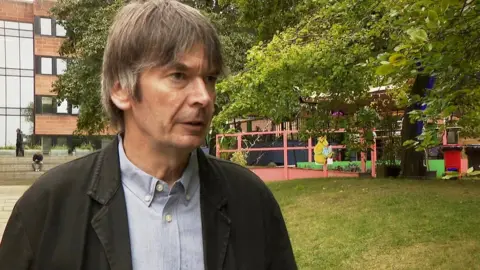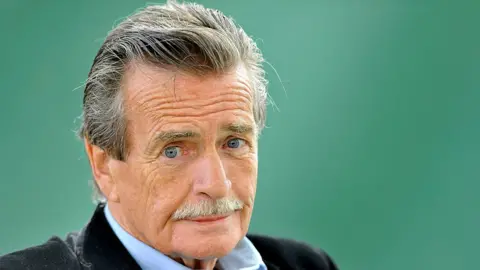Rankin 'honoured' to complete McIlvanney novel
 BBC
BBCCrime writer Ian Rankin has said it was an "incredible honour" to be asked to finish writing the last novel by William McIlvanney.
Author of the acclaimed Glasgow detective novel Laidlaw, McIlvanney died in 2015 when he was working on his latest manuscript.
McIlvanney's widow Siobhan had the script sent to Rebus author Rankin to see if it could be finished.
The result is a new book authored by both men called The Dark Remains.
Rankin launched the new book at the Edinburgh International Book Festival, the event where he first met McIlvanney in the 1980s and told him he was writing what would become the first Rebus novel.
He said: " When I started to sift through the original book, the notes he had left, it was a bit higgledy piggledy.
"There were two or three books in there which he was contemplating but one of them he had actually made a good start on, which was The Dark Remains."
 Robbie Jack
Robbie JackRankin told BBC Scotland that he gave his verdict on how the manuscript could be finished and said he was shocked to then be asked to do the job.
"That was when I took a sharp intake of breath and thought, do I really want to get into this?," he said.
"He was such a hero of mine and his style was so different from mine, I thought can I do it?".
McIlvanney, described as The Godfather of Tartan Noir, was born in Kilmarnock and was a high school teacher in Ayrshire before going on to become on of the most-celebrated Scottish novelists.
His 1975 novel Docherty brought him widespread acclaim before Laidlaw was hailed for changing the face of crime fiction.
'Hear his voice'
Rankin describes the process of writing the book as an "act of ventriloquism" in trying to capture McIlvanney's writing style.
The Edinburgh-based author said he spent months re-reading McIlvanney's novels "to try and get his rhythm" and researching what Glasgow was like in 1972, the year the novel was set.
This ranged from studying street layouts of the city to reading up on the crime gangs operating at the time.
The writing took place during the lockdown which Rankin describes as "lovely escape from the world of Covid" and the author said the biggest thrill came when he sent off the finished version to McIlvanney's widow Siobhan.
He explained: "She wrote me a letter to say how much she enjoyed it.
"She couldn't see the join and said it was as if he was in the room with her again, she could hear his voice."
Rankin said his only hope was that he had "done it some justice" given the high esteem that McIlvanney was held in by crime fiction readers.
Awards shortlist
Meanwhile, a five-person shortlist has been unveiled for the McIlvanney Prize.
The accolade, previously called the Scottish Crime Book of the Year Award, is named in memory of William McIlvanney.
The finalists include 2015 winner of the award Craig Russell, established names Stuart MacBride and Alan Parks and two debut authors, Emma Christie and Robbie Morrison.
